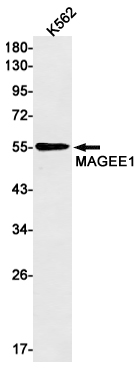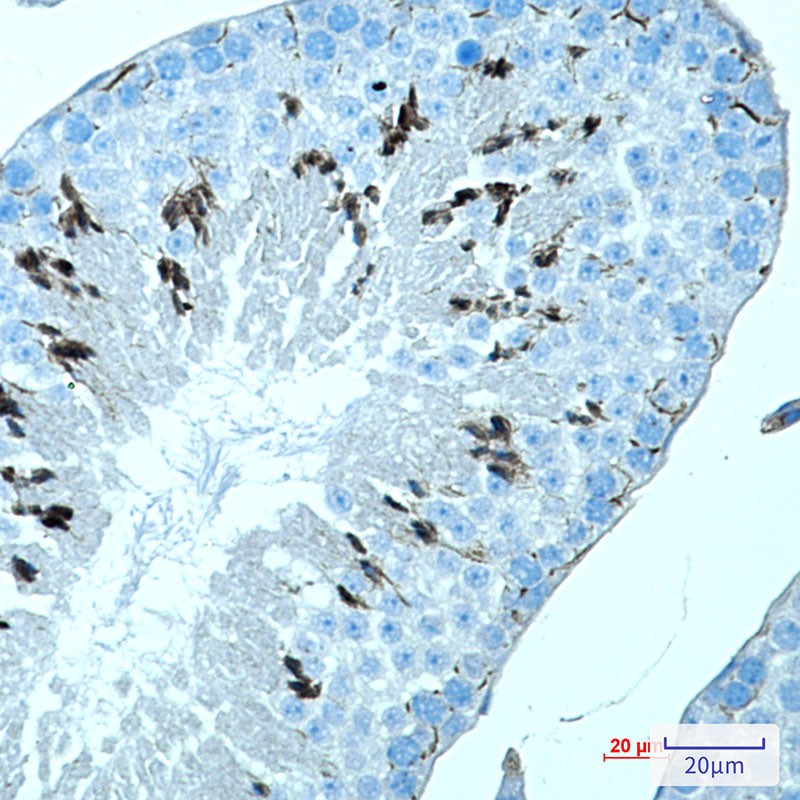

| WB | 咨询技术 | Human,Mouse,Rat |
| IF | 1/20 | Human,Mouse,Rat |
| IHC | 1/50-1/100 | Human,Mouse,Rat |
| ICC | 技术咨询 | Human,Mouse,Rat |
| FCM | 咨询技术 | Human,Mouse,Rat |
| Elisa | 咨询技术 | Human,Mouse,Rat |
| Aliases | CT10 |
| Entrez GeneID | 51438 |
| WB Predicted band size | Calculated MW: 41 kDa; Observed MW: 55 kDa |
| Host/Isotype | Rabbit IgG |
| Antibody Type | Primary antibody |
| Storage | Store at 4°C short term. Aliquot and store at -20°C long term. Avoid freeze/thaw cycles. |
| Species Reactivity | Human,Mouse |
| Immunogen | Recombinant protein of human MAGEE1 |
| Formulation | Purified antibody in TBS with 0.05% sodium azide,0.05%BSA and 50% glycerol. |
+ +
以下是关于 **MAGEC2抗体** 的3篇代表性文献,内容涵盖其应用方向和研究背景:
---
1. **文献名称**:*MAGEC2 promotes cancer progression through targeting KDM1A and activating Wnt/β-catenin signaling in hepatocellular carcinoma*
**作者**:Li Y, et al.
**摘要**:该研究验证了MAGEC2在肝癌中的高表达与不良预后相关,并通过抗体检测发现其通过调控KDM1A和Wnt通路促进肿瘤侵袭转移。研究提示MAGEC2抗体可用于肝癌的分子分型诊断。
2. **文献名称**:*Cancer-testis antigen MAGEC2 promotes proliferation and resistance to apoptosis in multiple myeloma*
**作者**:Andrade VC, et al.
**摘要**:利用MAGEC2特异性抗体进行功能研究,发现其在多发性骨髓瘤中通过抑制p53通路增强细胞增殖和化疗耐药性,为靶向MAGEC2的抗体药物开发提供依据。
3. **文献名称**:*Development of a novel monoclonal antibody specific for MAGEC2 with diagnostic applications in melanoma*
**作者**:Gure AO, et al.
**摘要**:报道了一种新型MAGEC2单克隆抗体的开发,验证其特异性及在黑色素瘤组织中的高敏感性,证明其可作为肿瘤免疫组化标志物辅助临床诊断。
---
**研究方向补充**:
MAGEC2属于癌症-睾丸抗原(CTA)家族,在多种实体瘤中异常表达,是肿瘤免疫治疗(如CAR-T或疫苗)的潜在靶点。上述文献中的抗体研究主要集中在疾病机制探索、诊断标志物开发及治疗靶点验证等领域。如需更详细文献或实验应用细节,可进一步补充说明。
MAGEC2 (Melanoma-associated antigen C2) is a member of the MAGE protein family, which is characterized by shared MAGE homology domains. These proteins are predominantly expressed in germline cells but are often reactivated in various cancers, earning them the classification of cancer-testis antigens (CTAs). MAGEC2. specifically, is encoded by the *MAGEC2* gene located on the X chromosome (Xq27.2) and is implicated in tumorigenesis through roles in cell proliferation, apoptosis resistance, and metastasis. Its restricted expression in normal tissues and overexpression in malignancies—such as melanoma, lung, liver, and ovarian cancers—make it a potential target for immunotherapy and diagnostic biomarkers.
MAGEC2 antibodies are tools developed to detect and study this protein’s expression and function. They are used in research applications like Western blotting, immunohistochemistry (IHC), and immunofluorescence (IF) to explore MAGEC2’s role in cancer progression and its interaction with pathways like ubiquitination or epigenetic regulation. Clinically, these antibodies may aid in identifying MAGEC2-positive tumors for targeted therapies, including CAR-T cells or cancer vaccines. However, challenges exist due to MAGEC2’s high homology with other MAGE family members (e.g., MAGEC1), requiring stringent validation to ensure antibody specificity. Ongoing studies aim to leverage MAGEC2’s immunogenic properties while addressing cross-reactivity and functional redundancy issues within the MAGE family.
×